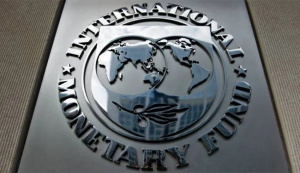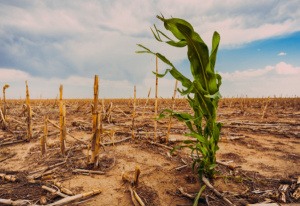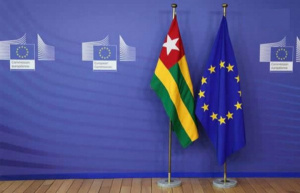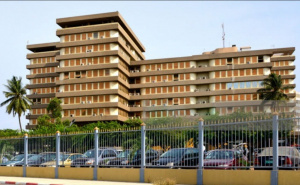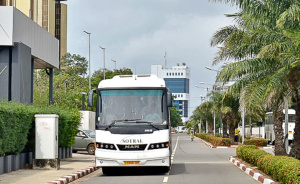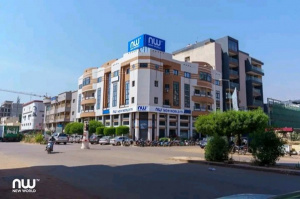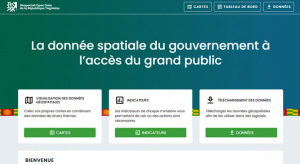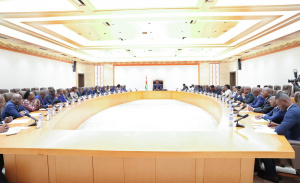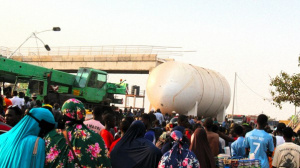Togo First
IMF Approves $58.7 Million Disbursement for Togo
On December 20, 2024, the International Monetary Fund (IMF) approved the release of approximately $58.7 million for Togo, as part of the first review of its Extended Credit Facility (ECF) program. This funding is intended for budget support and is part of a larger 42-month agreement worth $390 million, which was established in March 2024.
The facility will help bolster the Togolese economy, making it more resilient to crises like COVID-19 and rising food and fuel prices on a global scale. The IMF reported that Togo's economic growth was 5.6% in 2023 and is expected to remain at 5.3% in 2024-2025. Additionally, overall inflation decreased to 3.3% in October 2024, down from much higher levels in previous years.
Despite these positive indicators, Togo faces significant challenges, including ongoing insecurity in the northern region, where sporadic terrorist attacks occur. Besides putting pressure on public finances, these issues make it hard to reduce deficits and improve debt sustainability.
"The Togolese authorities have demonstrated strong implementation of the program supported by the Extended Credit Facility (ECF)," said Bo Li, IMF Deputy Managing Director. "Despite security challenges and difficult financing conditions, they have met all quantitative targets and made progress on structural reforms to strengthen revenue mobilization, inclusion, and public financial management."
The IMF encourages the government to continue its structural reforms, particularly in the financial sector, as it restructures its last public bank. The IMF also welcomed the authorities' commitment to improving transparency in public procurement management.
"It will also be essential to pursue efforts to strengthen governance. The authorities' recent request for an IMF governance diagnostic is welcome, as is their commitment to strengthen declarations of beneficial ownership for companies benefiting from public contracts," the IMF stated.
Fiacre E. Kakpo
Togo Starts Updating National Climate Change Plan
Togo is updating its National Climate Change Adaptation Plan (PNACC). The project kicked off on December 23, in Lomé. The PNACC addresses climate change impacts, including irregular rainy seasons, agricultural land degradation, and heightened natural disaster risks.
Environment Director Méry Yaou emphasized the need for regular updates to the plan. "It is essential to reassess the measures taken, integrate new challenges and emerging needs, and propose initiatives to help populations and ecosystems adapt sustainably," she stated.
The UN Food and Agriculture Organization (FAO) backs the update. Commenting on the project, Oyetunde Diwa, a Program Officer at FAO, said: "When it comes to climate change, every life counts. We are working to identify and validate priority adaptation options, with a focus on financing them”.
The original PNACC was validated in May 2017 and outlined significant changes in Togo's climate system due to natural and human factors. The five-year plan focused on three strategic areas: integrating climate adaptation into planning documents, implementing adaptation options and capacity building, and mobilizing financing for adaptation. These priorities will be maintained but adapted to current conditions.
Ayi Renaud Dossavi
Togo: EU Supports State Budget with CFA12.8 Billion Grant
The European Union (EU) will support the Togolese State budget with CFA12.8 billion. The Togolese Ministry of Economy and Finance announced the news via a press release issued on December 23.
According to the source, Lomé will use the funding, a grant, to implement the Togo 2025 Roadmap.
Togolese authorities noted that this support follows a prior assessment showing significant progress in key areas like decentralization, sustainable agribusiness, and improved access to basic social services for vulnerable populations.
For Sandra Ablamba Johnson, Minister, and Secretary-General of the Presidency of the Republic, the facility recognizes efforts made by the Togolese government to implement its priorities. "On behalf of the President of the Republic, I would like to express my gratitude to the European Union for the quality of the partnership and, above all, for its support in implementing projects and programs to promote the population’s wellbeing," she declared.
"This is the fruit of ongoing work and dialogue between the Ministry of Economy and Finance, the sectoral Ministries concerned by this budgetary support, and the European Union," added Essowè Georges Barcola, Minister of Economy and Finance.
The European side said the facility aims to bolster its partnership with Togo. "This donation to the State budget illustrates the close partnership between the European Union and Togo," said Gwilym Jones, EU Ambassador to Togo.
The EU-Togo partnership, which extends until 2027, is expected to mobilize several hundred million euros for priority projects through budget support, loans, grants, guarantees, and technical assistance.
Esaïe Edoh
Togo Raises 2024 Fiscal Year Budget by 3.3%
Togo's Council of Ministers approved an amending finance bill for the fiscal year 2024 on December 16, increasing the initial budget by 3.3%. This adjustment raises the budget forecast to CFA2,250.6 billion; it integrates an increase in budget revenues and cash resources.
In detail, budget revenues increased by CFA63.4 billion (5%), totaling CFA1,343.5 billion, compared to the initial forecast of CFA1,279.1 billion. The rise was primarily driven by a 6.8% increase in tax revenues, from CFA1,042 billion to CFA1,113 billion.
Non-tax revenues also rose by CFA10.2 billion, to CFA71 billion. Additionally, budgetary support from external contributions increased by 31%, reaching CFA16.7 billion from CFA12.7 billion.
Cash resources grew by CFA5.4 billion, totaling CFA901.2 billion compared to the initial budget of CFA895.9 billion.
The government stated that this revision reflects the integration of new budgetary priorities amid economic uncertainties at both sub-regional and international levels. These adjustments aim to strengthen the State's capacity to address the economic and social challenges of 2024.
Esaïe Edoh
Togo: SOTRAL Implements Fare Reductions for Public Transport
Société des Transports de Lomé (SOTRAL) has announced a fare reduction for urban transport in Togo, starting December 23, 2024. The price for trips that used to cost CFA150 will now be CFA100, a 33% decrease. Other fares are also being lowered: routes that cost CFA250 will now be CFA200, and those priced at CFA300 will drop to CFA250. Even the highest fares, which were CFA350, will now be CFA300.
SOTRAL said this change aims to make transportation more affordable for people in Lomé, especially given the high cost of living.
Lower prices for petroleum products
This fare reduction follows the Togolese government's recent cut in diesel prices, which dropped from 775 to CFA695 per liter. This decrease helps lower transportation costs.
Before the SOTRAL fare reduction, intercity fares for transporting people and goods had already been lowered on 76 routes across the country. For example, the Lomé-Tsévié route now costs CFA800, while Lomé-Kara is priced at CFA5,850, and Lomé-Mango costs CFA7,500. Routes like Sokodé-Mango and Dapaong-Mandouri are capped at CFA3,000 and CFA1,800, respectively.
Ayi Renaud Dossavi
Togo: New World TV Launches Satellite Service in Mali
Lomé-based media group New World TV has expanded its operations into Mali, officially launching its satellite television package (DTH) on December 12, 2024. The new package offers a variety of programs, including entertainment, news, and sports. The company's management expressed satisfaction with this launch, calling it a significant step in their goal to connect African populations and showcase the continent's cultural heritage.
This launch is part of a broader strategy to enhance New World TV's African presence while highlighting local content. The group has partnered with the African Export-Import Bank (Afreximbank), securing a financing facility of €245 million, or around CFA160 billion, to acquire broadcasting rights for major sporting events.
Esaïe Edoh
Togo Launches Open Data Platforms for Public Access
To improve public access to essential information, Togo has launched two new platforms, Open Data and Géoportail Open Data. The announcement was made on December 19, 2024, by the Ministry of Digital Economy and Digital Transformation through Agence Togo Digital (ATD). These platforms aim to enhance government transparency and support strategic planning by providing free access to data on socio-economic infrastructure.
"This data will enable our citizens, researchers, and entrepreneurs, as well as visitors, to better understand the realities of these sectors and develop solutions tailored to our needs," said Roger Lasmothey, representing Minister Cinna Lawson at the presentation. "By facilitating access to this information, we are promoting transparency, innovation, and inclusion," he added.
Open Data
Togbe Agbagla, ATD's Technical Director, introduced the two new platforms. The Open Data Géoportail (available via geodata.gouv.tg) consolidates geospatial data for all of Togo. It was created from extensive data collection during the PRISE project between 2021 and 2022, gathering information from 23 ministries and over 550 administrative units. Users can view interactive maps, access social and economic infrastructure data, and download datasets for analysis.
Geoportal
The Open Data platform (opendata.gouv.tg) provides essential public data, thus fostering transparency, innovation, and informed decision-making. It spans health, education, and agriculture but will expand to include more public data over time. Initiatives are planned to promote these tools among civil society, academia, and researchers.
Ayi Renaud Dossavi
Broadband: Togo Gets $100M from World Bank to Connect 8,000 Public Institutions
This funding aims to connect around 8,000 public institutions, including schools and health facilities, to broadband internet. The project should benefit over a million people.
In partnership with the International Finance Corporation, the initiative will also focus on developing digital skills to enhance employability and attract more investment into Togo's entrepreneurial ecosystem. Also, the project will develop climate-resilient digital infrastructures, emphasizing energy efficiency and climate mitigation solutions.
Cina Lawson, Minister of Digital Economy and Digital Transformation, stated, “This initiative will connect our schools, healthcare facilities, and public institutions to ultra-high-speed internet while equipping our youth with the skills needed to build a competitive and resilient economy.”
The project aligns with Togo's government roadmap and the World Bank's Country Partnership Framework, positioning digital technologies as a key driver for growth, economic development, and regional competitiveness.
Fily Sissoko, World Bank Resident Representative for Togo, emphasized, “By focusing on digital technologies, we aim to support the government's strategy of accelerating the country's economic transformation.”
This funding follows recent financial support of $200 million for administrative and social reforms and an additional $300 million earmarked to develop the agricultural sector, specifically for soy and corn production.
Ayi Renaud Dossavi
Togo: Expenses Up CFA71B in Revised 2024 Draft Budget
The Togolese government approved a revised budget for 2024 on December 16, 2024. The new total is CFA2,250.6 billion, up from the projected CFA2,179.2 billion. This 3.3% increase, or CFA71.4 billion, is due to new priorities amid economic uncertainties.
The government plans to use this finance bill to implement structural reforms and development policies as part of the Government Roadmap 2025 and to strengthen its fight against terrorism.
The Togolese economy is expected to grow by 6.6% in 2024, up from 6.4% in 2023, thanks to positive growth in all sectors. However, the government had to adjust the budget due to financial pressures, using savings for emergency spending.
This change is part of a commitment to “budgetary sincerity” and transparency, according to Christian Trimua, Secretary General of the government. The revised budget will now be sent to Parliament for approval.
The increase aligns with Lomé’s efforts to handle economic challenges while keeping its development goals and enhancing national security.
Ayi Renaud Dossavi
Togo: Government Sets Up Commission to Investigate Recent Tragedy in Agoè
The Togolese government will set up a commission to investigate the tragic incident recorded in Agoè, at the northern exit of Lomé, last Friday, December 13. A pedestrian bridge collapsed, causing the death of eight people and leaving three with serious injuries. A truck was involved.
On December 16, the Council of Ministers decided to set up an investigation commission to determine the technical causes of the collapse. “Instructions have been given to ensure that criminal responsibilities are clearly established and receive all appropriate judicial follow-up,” the Council noted in an official statement.
The judicial police have already questioned the manager of the company owning the truck involved in the accident. He was taken into custody. Hearings were conducted with the managers of the companies responsible for building the structure and its equipment. Authorities are investigating whether or not shortcomings in the design, execution, or maintenance might have contributed to the incident.
The accident was triggered by a semi-trailer transporting gas, whose gauge collided with the bridge, causing it to collapse. The government has also announced support measures for the victims’ families. The Council of Ministers pledged to provide them with "adequate" support.
Esaïe Edoh

